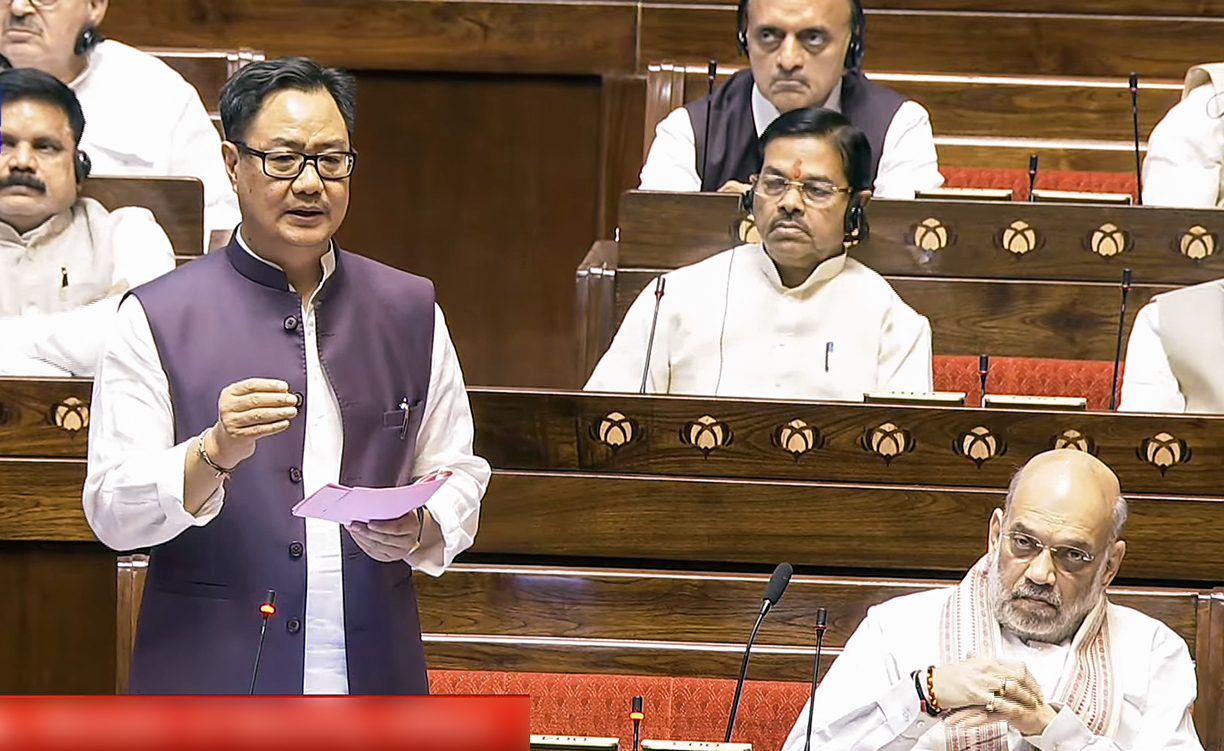Union Minority Affairs Minister Kiren Rijiju on Thursday defended the Waqf (Amendment) Bill, 2025, against allegations that it would undermine Muslim interests. Rijiju clarified that the bill does not allow non-Muslims to interfere in the management of the Waqf Board, emphasizing that the management, creation, and beneficiaries of Waqf properties would remain exclusively within the Muslim community.
Rijiju introduced the bill in the Rajya Sabha amidst widespread concerns and criticism, asserting that the new legislation would strengthen the governance of Waqf properties and enhance transparency. He categorically rejected claims that the bill would be unconstitutional or infringe on the rights of Muslims. “Any Muslim who wishes to manage their property through a trust can do so without restrictions,” he stated.
The minister explained that the Waqf Board functions much like a Charity Commissioner. He added that the bill would require proof of ownership before a property could be declared Waqf, removing the previous provision where any claim by the Waqf Board would automatically result in the property being designated as Waqf.
Rijiju also said that the bill had undergone extensive consultation before being introduced. Over one crore memoranda and suggestions were received from the public, and a Parliamentary Committee conducted consultations in ten cities, including Mumbai, Kolkata, Ahmedabad, Hyderabad, Patna, Chennai, Bengaluru, Guwahati, Bhubaneswar, and Lucknow.
The minister traced the government’s reform efforts back to the 1976 Congress-led government’s inquiry commission and the 2006 Sachar Committee Report, which recommended strengthening and digitizing the Waqf Board. At the time, Waqf properties totaled 4.9 lakh, generating an annual income of Rs 163 crore. The Sachar Committee had estimated that, with proper management, these properties could generate Rs 12,000 crore annually. Today, the number of Waqf properties has grown to 8.72 lakh, with the potential for much higher revenue.
Rijiju also referred to the Joint Parliamentary Committee (JPC) report led by K. Rehman Khan, a former Minority Affairs Minister, which had pointed out the Waqf Board’s inadequate infrastructure, manpower, and funding. The JPC recommended establishing a centralized data bank and structured leasing policies for Waqf properties. Rijiju asserted that the current government was implementing these long-overdue reforms, which previous Congress and UPA governments had failed to act upon.
In his address, Rijiju highlighted the differences in the approach of the Modi government compared to the Congress-led UPA. The 2013 UPA government had set up a JPC to reform the Waqf Board ahead of elections, but the current JPC, formed under the BJP government, had engaged more comprehensively, with 31 members, 36 meetings, consultations with 284 delegations and organizations, and inputs from 25 states, five minority commissions, and multiple lawmakers.
Rijiju also pointed out that the number of memoranda submitted had significantly increased from just 32 in 2013 to over one crore now, reflecting the widespread public participation in the reform process.
Rijiju emphasized that the BJP government is committed to implementing these long-pending reforms. “These committees were set up during Congress and UPA rule, yet they failed to act. The Narendra Modi government is fulfilling the recommendations that the Congress did not dare to implement,” Rijiju stated.
The Waqf (Amendment) Bill, 2025, according to Rijiju, will ensure greater accountability and efficiency in the management of Waqf properties, address long-standing concerns, and safeguard the rights and autonomy of the Muslim community.
(With IANS inputs)




















